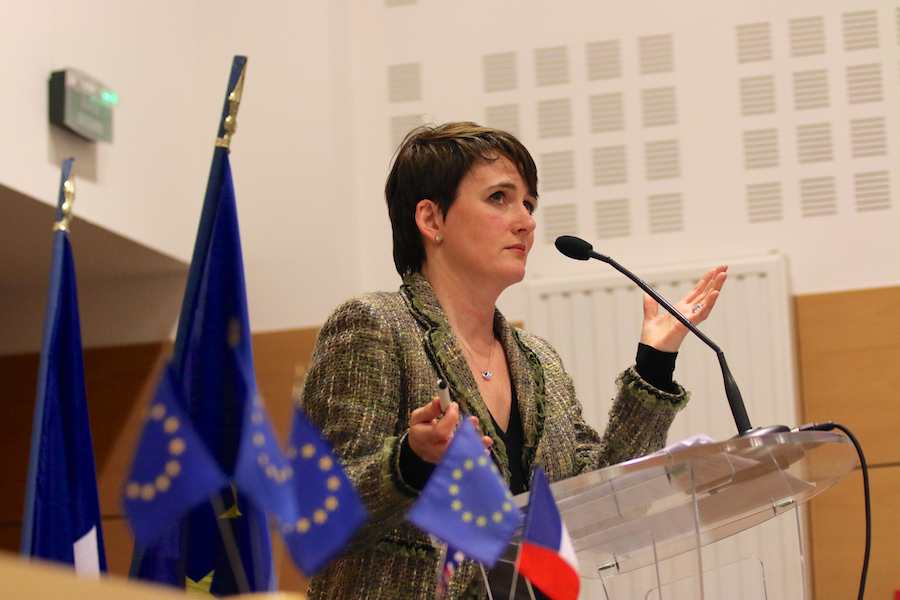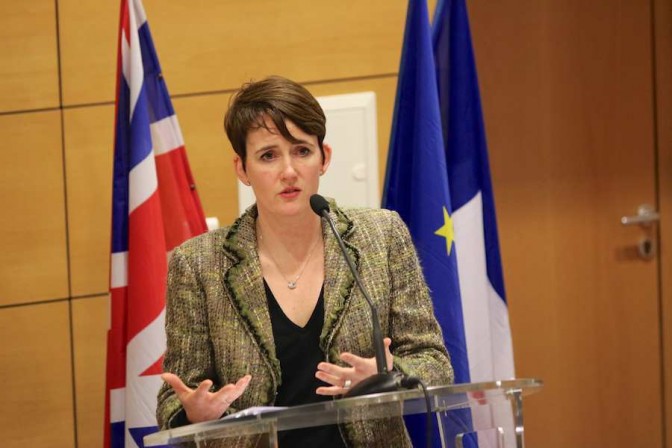Kara Owen, Deputy Head of Mission at the British Embassy in Paris
It’s with a faint “wow” that Karen Owen, deputy ambassador of the United Kingdom in France, entered the Amphitheatre Berlin, on the European Franco-German campus in Nancy, on Thursday, 13th February 2014. As students kept rushing in, even our director François Laval welcomed her with the highest possible honour : some words in English. Narrative of the conference.
France and Great Britain share “similar histories” as well as similar international insolvents in the Security Council, the G20 and G8 groups. For this reason, the two countries are basically “aligned in foreign policy issues.” “I think we agree with France more often on foreign policy than we do with any other country.” According to Ms Owen, voting behaviour at the UN General Assembly are the same 95% of the time, whereas UK and the US align in only 60% of the cases. “Both countries agree that, given the background, they have a responsibility to have activist foreign policies.”
Kara Owen lists five main foreign policy issues on with the United Kingdom and France work closely together : Syria, NATO, Iran, Africa, and the prevention of sexual violence in conflicts.
As far as the Syrian conflict is concerned, Ms Owen stated, that “we, the French and our international partners are appalled by the loss of lives and the suffering of the Syrian people”, though reinforcing that for the United Kingdom, a “political settlement is the only way to get over the conflict.” She added that the UK supports the Syrian national coalition, as well as the efforts by the United Nations and the Arab League, though the “dialogue is on-going and is really hard.”
With a total amount of 600 Million pounds, the UK involvement in Syria is the “largest ever single response to a humanitarian crisis.”
As Britain will host the NATO-summit later this year, Kara Owen stressed the importance of adapting NATO to the 21st century : “We have a completely different situation today than in 1949”, though she speaks out against a suppression of NATO.
Africa bears strong interests of both the UK and France. Nevertheless, Ms Owen stressed the efforts made in capacity building, which “is not interfering but supporting.” She stressed that “there are some really big success stories”, citing Sierra Leone.
“It was a surprising image seeing my boss, William Hague, standing next to Angelina Jolie”, she says, smiling, and referring to the involvement of the Hollywood star in the prevention of sexual violence in conflicts. “The UK has been leading,” she says, “along with partners, in getting a G8 declaration on the subject.”
Britain and the EU

The following question and answer hour though turned mainly around Great Britain’s position in the European Union. “As the Euro-Area changes and reforms in order to become more and more efficient and successful, we have to find a way for the countries inside and outside to work together, in order that those two blocs can be treated fairly”, she says. “The UK believes in an effective European Union”, she continues, stressing that this “is not only a selfish UK-interest. Most countries in Europe are thinking about how the EU can become more efficient, and more democratically accountable.” To make the European Union more democratically accountable, Ms Owen suggested strengthening the role of national parliaments.
Echoing Prime Minister David Cameron’s Bloomberg Adress, Ms Owen said that “it conservative party policy that if [David Cameron] wins the next general election, he will ask the people if they want to stay or leave a reformed European Union.” She though repeated that David Cameron “has also stated that he believes the interests of the UK are best served inside a reformed and best working European Union.”
Ms Owen did not want to comment on a hypothetical future outside of the European Union, though she does not see the future of the United Kingdom “isolated and as an island.” “The European issue has been really present in British politics for a generation,” she said, “and there will be some detrimental effects if UK left the EU. There are advantages of being in – the access to the single market is crucial.”
Asked about the perspectives for a European army, Ms Owen said : “We want Europe to work well together in defense. We are not a huge fan of setting up elaborate institutions that cost a lot of money. We rather favour the use of existing institutions in order to act together”, she said.
Objectivity, integrity, honesty
Kara Owen entered the Foreign Office with 22 years, after studying history at the University of Sheffield. “We do an awful lot of training on the job, rather than believing that the only way to be effective is to have an awful lot of academics”, she says, referring to the different patterns of civil servant training in the UK and France. Though, “we all end up with high quality diplomats”, she acknowledged.
Ms Owen further was an envoy to Hong Kong, in order to oversee the transition in power between Great Britain and China. “There was nervousness that the freedoms the people of Hong Kong enjoyed were not impacted. We worked for the rights and liberties they enjoyed to be conserved”, she said at the conference.
“I wanted an international career, I didn’t want profit to be my motive, I wanted serving to be my motive, and I want things to constantly change.” After a brief time in London, she was sent to Hanoi, Vietnam, as first advisor. “I wouldn’t be sad about going back to Hong Kong or Vietnam”, she said.
One of the biggest challenges of being a civil servant, she said, is to defend positions which are not always your own. “Our core values are objectivity, integrity, honesty,” she said. “I’m a civil servant in a democracy. I wasn’t elected. The British people elected my ministers to take decisions on their behalf. I have to give the best advice, but when they have decided, it is my constitutional position to make that policy work.”
(Additional reporting by Julia Friedrich.)
Published in Le Parvenu on the 16th february 2014
